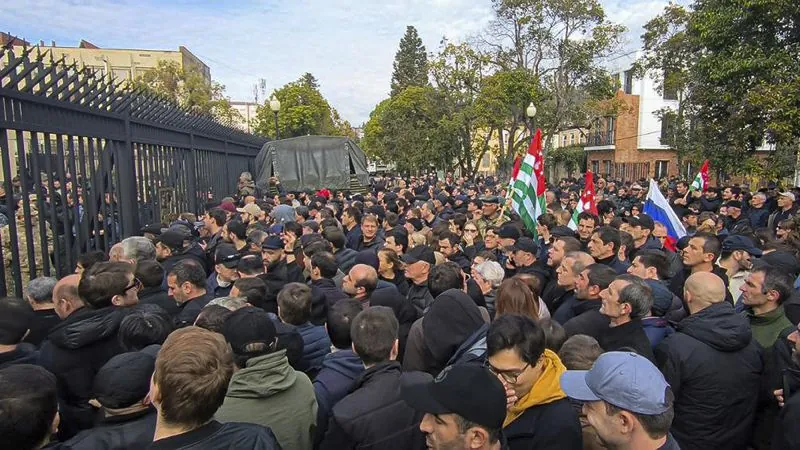
Unrest in Abkhazia: Protesters Demand President's Resignation Amid Controversial Russia Deal
2024-11-15
Author: Ling
In a dramatic escalation of tensions, protesters stormed the parliament of the Russian-backed breakaway region of Abkhazia on Friday, demanding the resignation of President Aslan Bzhania over a contentious investment deal with Moscow. The unrest sheds light on the precarious position of Abkhazia, a region that declared independence from Georgia amid the chaos of the early 1990s, but remains heavily reliant on Russian support.
The deal in question has sparked outrage among locals, who fear it would facilitate wealthy Russian investors in buying up property in the picturesque Black Sea region, threatening the livelihood of ordinary Abkhazians. The protests began when activists used a truck to crash through the metal gates of parliament, quickly followed by a rush of demonstrators entering the building through windows after tearing off metal bars.
Temur Gulia, an opposition leader, asserted in an interview that while protesters initially sought to annul the investment agreement, they have since escalated their demands to the outright removal of President Bzhania. "The people demand the resignation of Aslan Bzhania and are determined to see it through," he stated.
As the chaos unfolded, demonstrators also invaded the presidential administration offices located within the same complex as the parliament. Emergency medical services reported that at least nine individuals required hospitalization due to the ensuing clashes.
In a message via the Telegram app, Bzhania emphasized his intention to remain in office, stating, "I am staying in Abkhazia and will fulfill my duties as president." He urged calm among the populace and stressed the need to manage the aftermath of the unrest. While he claimed talks were ongoing with opposition members, reports suggest he was not present in the complex during the breach.
The discontent fueled by the investment agreement has drawn significant comment from experts like Olesya Vartanyan, who pointed out that the political crisis reflects growing pressure from Moscow on Abkhazia to yield further concessions in exchange for its continued financial support. "The Russians are paying them; they want something back," Vartanyan explained, noting the unspoken tension regarding property rights for Russian citizens.
Should Bzhania be ousted, he would become the third local leader to be overthrown in such a manner since Russia's recognition of Abkhazia's independence in 2008—an event that followed a brief war with Georgia. Historically, any leader emerging in Abkhazia post-recognition has battled the dual pressures of aligning with Moscow while juggling domestic expectations.
The situation in Abkhazia is particularly sensitive as most of the international community still considers it a part of Georgia. The opposition stressed that their protests were not aimed at severing ties with Russia but were a reaction to Bzhania's perceived exploitation of Russian-Abkhaz relations for personal gain. "Abkhazian society had only one demand: to protect the interests of our citizens and our businesses," their statement concluded.
As tensions remain high and the parliament remains in a state of siege, the eyes of the world will be watching closely to see how this conflict unfolds in a region teetering between independence dreams and Moscow's heavy-handed influence. What does this mean for the future of Abkhazia, and could this spark a chain reaction of unrest in other regions under Russian control? Stay tuned as the situation develops.


 Brasil (PT)
Brasil (PT)
 Canada (EN)
Canada (EN)
 Chile (ES)
Chile (ES)
 España (ES)
España (ES)
 France (FR)
France (FR)
 Hong Kong (EN)
Hong Kong (EN)
 Italia (IT)
Italia (IT)
 日本 (JA)
日本 (JA)
 Magyarország (HU)
Magyarország (HU)
 Norge (NO)
Norge (NO)
 Polska (PL)
Polska (PL)
 Schweiz (DE)
Schweiz (DE)
 Singapore (EN)
Singapore (EN)
 Sverige (SV)
Sverige (SV)
 Suomi (FI)
Suomi (FI)
 Türkiye (TR)
Türkiye (TR)